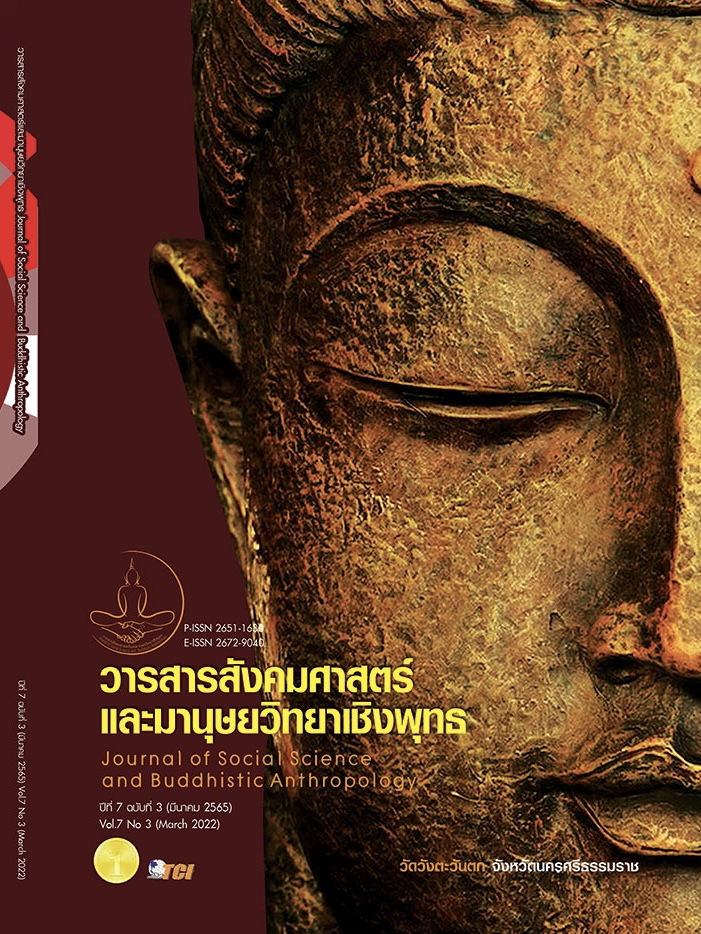FACTORS AFFECTING THE SUCCESS OF COOPERATION NETWORK MANAGEMENT IN THE FOREST FOR INCOME PROJECT ACCORDING TO THE ROYAL INITIATIVE OF MAHA CHAKRI SIRINDHORN
Keywords:
Network Management, Success, Royal ProjectAbstract
The Objectives of this research article were to 1) to study the factors of a cooperation network in the Forest for Income project, 2) to assess the success of cooperation network management in the Forest for Income project, 3) to identify the factors affecting the success of cooperation network management in the Forest for Income project, and 4) to develop a cooperation network model for the Forest for Income project. This study used a quantitative study approach. Data collection was conducted using questionnaires with a 5-rating scale. Samples included 594 educational administrators, group directors, and officers connected to the cooperation network in the Forest for Income project according to the royal initiative of Maha Chakri Sirindhorn. The size of samples was determined based on Taro Yamane. The number of returned questionnaires was 548, and the reliability of the questionnaires was.988. Data analysis was carried out using computer software to calculate mean ( ), standard deviation (S.D.), and multiple regression analysis. The results showed that most samples agreed that the operation of the project was good in almost every aspect. For the success of the cooperation of the project, samples agreed that the operation was good in every aspect. Multiple correlation was .944 that could predict 89% accuracy, and the model for the cooperation network in the project involved invitation, tracking, group process support, group registration, forest for income development, suitability conclusion about planting, planting plan, participant recruitment, and plant procurement.
References
กฤติลักษณ์ กันโต และคณะ. (2563). การมีส่วนร่วมของราษฎรผู้เข้าร่วมโครงการสร้างป่าสร้างรายได้จังหวัดเลย. วารสารมนุษยศาสตร์และสังคมศาสตร์ มหาวิทยาลัยราชภัฏอุบลราชธานี, 11(2), 349-359.
กำจร ตติยกวี. (2558). การประชุมระดับโลกว่าด้วยการศึกษา ณ เมืองอินชอน สาธารณรัฐเกาหลี. กรุงเทพมหานคร: สำนักความสัมพันธ์ต่างประเทศ สำนักงานปลัดกระทรวงศึกษาธิการ.
โชติ บดีรัฐ และยุวดี พ่วงรอด. (2562). การพัฒนารูปแบบการบริหารจัดการชุมชนแบบบูรณาการในเขตเทศบาลนครพิษณุโลก. วารสารมนุษยศาสตร์และสังคมศาสตร์ มหาวิทยาลัยราชภัฏสุรินทร์, 21(1), 29-42.
เทพณรงค์ ยะสุข. (2557). สร้างป่า สร้างรายได้การประชุมสัมมนารักษ์ป่าน่าน. กรุงเทพมหานคร: ศูนย์การเรียนรู้และบริการวิชาการ เครือข่ายแห่งจุฬาลงกรณ์มหาวิทยาลัย.
มูลนิธิชัยพัฒนา. (2563). ทฤษฎีการพัฒนาฟื้นฟูป่าไม้อันเนื่องมาจากพระราชดำริ. เรียกใช้เมื่อ 11 มกราคม 2563 จาก https:// www.chaipat.or.th/concept-and-theory-development/theory-developed-forest-restoration.html
สำนักงานโครงการสมเด็จพระเทพรัตนราชสุดาฯ สยามบรมราชกุมารี. (2557). คู่มือการดำเนินงานโครงการสร้างป่าสร้างรายได้ตามพระราชดำริสมเด็จพระเทพรัตนราชสุดาฯ สยามบรมราชกุมารี. กรุงเทพมหานคร: สำนักพระราชวังสวนจิตรลดา.
อลงกต สารกาล และศักดิ์สิทธิ์ ฆารเลิส. (2561). แนวทางการสร้างองค์กรปกครองส่วนท้องถิ่นที่เป็นเลิศด้านการเสริมสร้างเครือข่ายรัฐ เอกชน และประชาสังคม กรณีศึกษาเทศบาลเมืองร้อยเอ็ด. วารสารรัฐศาสตร์และรัฐประศาสนศาสตร์, 9(1), 29-58.
Boissevain, J. & Mitchell, J. C. (1973). Network Analysis: Studies in Human Interaction. Netherlands: Mouton & Co.
Burke, A. (1999). Communications & Development: a practical guide. London: Social Development Division Department for International Development.
Isranews. (2562). สร้างป่า สร้างรายได้' สมเด็จพระกนิษฐาธิราชเจ้าฯ ทรงเน้นย้ำ เร่งส่งเสริมเลี้ยงไข่ไก่ในค่ายทหาร. น่าน: สำนักข่าวอิสรา.
Starkey, P. (1997). Networking for Development. London: IFRTD The International Forum for Rural Transport and Development.
Yamane, T. (1967). Statistics: An Introductory Analysis. (2nd Edition). New York: Harper and Row.
Downloads
Published
How to Cite
Issue
Section
License
Copyright (c) 2022 Journal of Social Science and Buddhistic Anthropology

This work is licensed under a Creative Commons Attribution-NonCommercial-NoDerivatives 4.0 International License.









